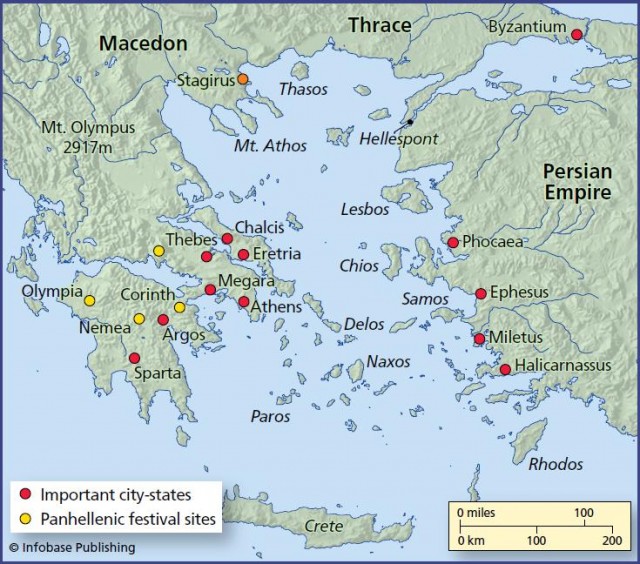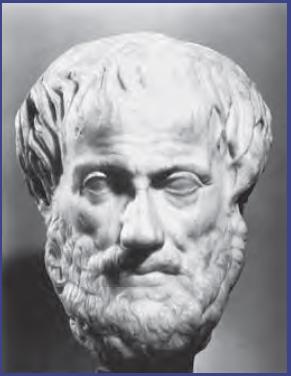Aristotle and His Natural History
Aristotle (384–322 b.c.e.) was a Greek philosopher who lived at a time when most people believed in a world governed by gods, demigods, and other supernatural beings. According to tradition, in the distant past these beings had made the plants and the stories about how they did so are woven into the Greek myths. It was Gaia, the Earth, for instance, who made the apple tree, as a wedding gift for the goddess Hera, who married Zeus. When the goddess Demeter was searching for her daughter, Persephone, a farmer called Phytalos welcomed her into his home. The goddess rewarded him by creating the fig tree and placing it on his land.
There was a traditional explanation for almost everything, and Aristotle rejected all of them. One of the most famous teachers the world has ever known, he taught his students that they should never accept anything as being true simply because tradition or a person in authority said it was. The only way they could acquire true knowledge of the natural world was by observing it.
Aristotle based his ideas about the natural world on a philosophical system. He believed that all matter had the potential to become form. For example, a seed was matter with the potential to grow into a plant, which was the form; an embryo was matter with the potential to grow into the form of an animal; and a block of stone was matter with the potential to be fashioned into the form of a sculpture. Everything in the natural world had a function and lay somewhere on a scale between pure matter and pure form, with matter lacking form at one end of the scale and form without matter at the other end. The scale was one of values, because as matter progressively acquired form its degree of organization increased. Among living things, Aristotle placed plants at the bottom, animals above plants, and humans above animals.

In his scheme every living thing possessed a soul, but by soul Aristotle meant the completed form of the original matter. In a sense it was the truth contained in the matter that had been revealed in its form. Plants had a soul containing a nutritive element that allowed them to grow and reproduce. Animal souls contained an appetitive element that allowed them to have sensations and desires and in order to satisfy those desires the appetitive element gave them the ability to move. Human souls had both the nutritive and appetitive features, but also a rational element, which gave them the capacity for thought.
Aristotle studied plants and animals and certainly dissected some animals. He wrote only about animals, however, leaving it to Theophrastus, his student and successor, to write about plants.
Aristotle was born in 384 b.c.e. at Stagirus, a Greek colony on the coast of Macedon (modern Macedonia). Both his parents were Greek and his father, Nichomachus, was the personal physician to Amyntas III, the king of Macedon. Nichomachus died when Aristotle was still a child and a guardian Proxenus raised him. When Aristotle was 17, Proxenus sent him to Athens to study at the Academy led by Plato (428 or 427–348 or 347 b.c.e.). Aristotle left Athens after the death of Plato, settling first in Anatolia in what is now Turkey and later on the island of Lesbos, where he lived from 345 to 343 b.c.e. The following map shows the geography of the region at that time.

It was while on Lesbos that Aristotle spent much time studying marine animals. In 343 b.c.e., Aristotle returned to Macedon, where King Amyntas had died and his son had succeeded him as Philip II.
Philip appointed Aristotle as tutor to his 13-year-old son, Alexander. When Alexander became king he had no more time for lessons, and in about 335 b.c.e. Aristotle returned to Athens, where for the next 12 years he taught at the Lyceum, one of the three most famous schools in the city. The school was located in the grounds of the temple to Apollo Lyceius, hence its name. The following illustration shows him as he may have appeared at around this time. There were colonnades—covered walkways—at the school, and Aristotle liked to walk through them, surrounded by students, while lecturing. The Greek word for colonnades is peripatoi, and the Lyceum school came to be known as the Peripatetic school. Alexander died in 323 b.c.e., and anti-Macedonian feelings began to run high in Athens. Aristotle was charged with impiety, a crime that could have carried a death penalty. Rather than stand trial, he left Athens and settled in Chalcis. He died the following year.